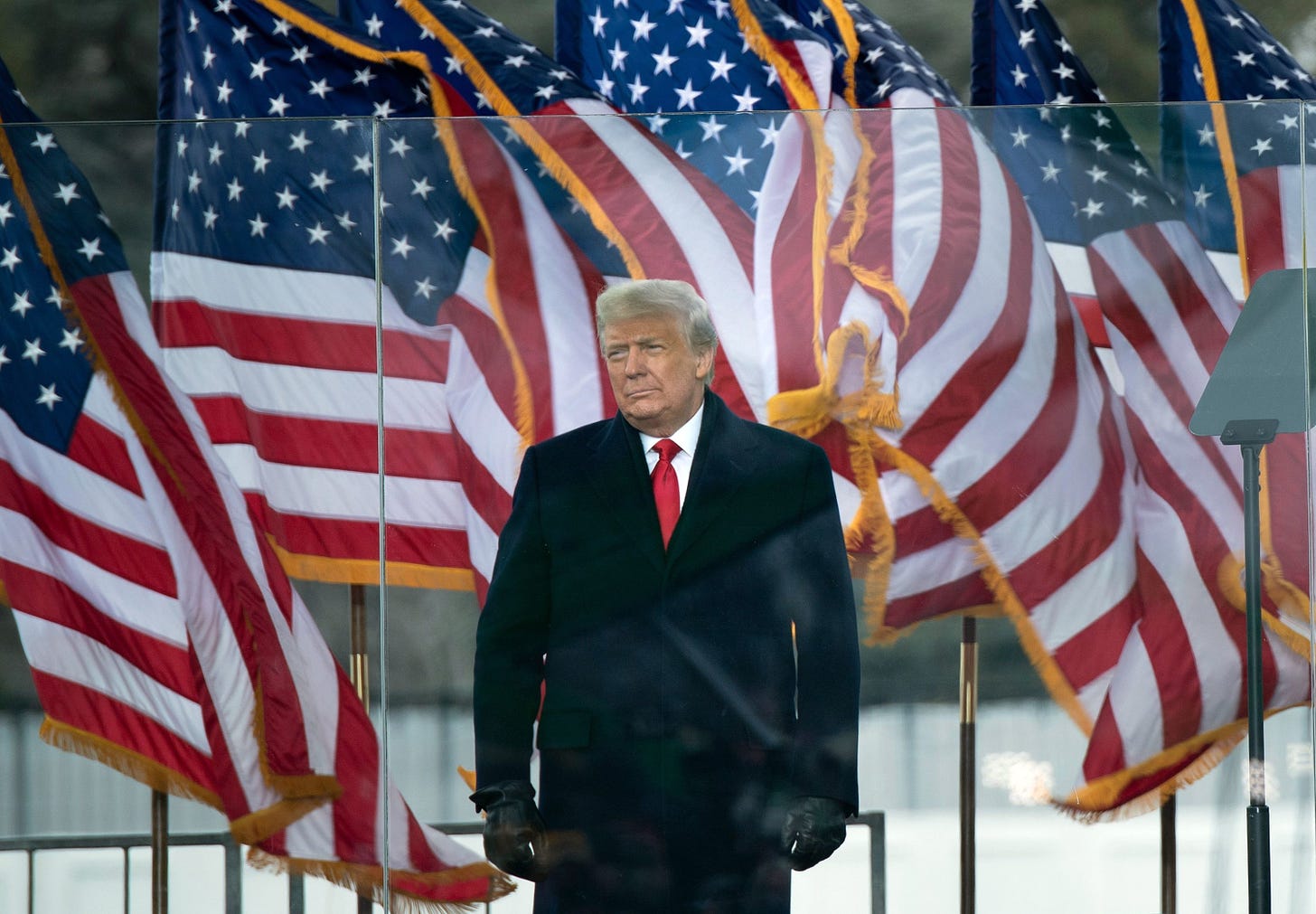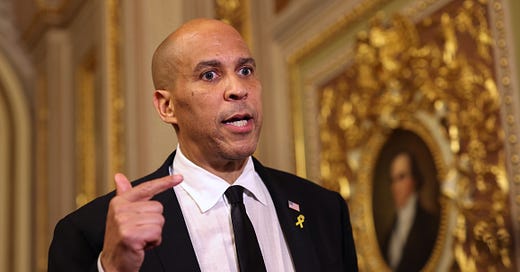

For years—decades even, depending on when you start counting—the road to holding Donald Trump accountable for criminal conduct has led nowhere. Robert Mueller’s toothless report on Russiagate. William Barr’s turning a blind eye to obstruction of justice. The Manhattan district attorney’s inexplicable refusal to follow the recommendations of his lead investigators. Two impeachment acquittals in the Senate. The list goes on.
Given that dismal history, it arguably borders on insanity to believe that law enforcement will, at long last, find the weak spot in Trump’s otherwise impenetrable armor of impunity.
But if anything can, my money is on the fake elector scheme.
Five months ago I wrote that the scheme to sign and submit phony electoral certificates in five states, executed by mostly low-level local officials, could mushroom into potential criminal accountability for high-level officials in Trump’s orbit, up to and including Trump himself. The idea was that if the Department of Justice sics the FBI on the local fraudsters, they will identify those who induced and aided them in perpetrating the fraud. Investigators would then follow the facts upward as far as they go, possibly all the way to Trump.
That was essentially the template followed some fifty years ago when a botched second-rate burglary brought down the president of the United States. When five hapless burglars were caught red-handed breaking into the Watergate complex on a June night in 1972, nobody predicted the mighty consequences that would flow from that mundane offense. But law enforcement, egged on by a relentless press and unable to ignore a flood of public revelations brought forward by a congressional investigation, followed the money, flipped the perpetrators, and brought the whole house down.
The phony elector scheme is now looking more each day like—wait for it—Trump’s Watergate. Yes, Nixon was an incumbent while Trump is out of office, but consider the parallels: Federal investigators are aggressively on the case, once again assisted by a relentless press, and public congressional hearings are again generating one stunning revelation after another.
Over a two-day period last week, at least nine people in four different states reportedly received federal grand jury subpoenas in connection with the fake elector investigation. The recipients included not only some of the phony electors themselves but also “aides to Mr. Trump’s campaign.” Federal agents also executed search warrants directed at the chairman of the Nevada Republican party and the party’s secretary.
Around the same time, federal investigators carried out a pre-dawn search at the home of Jeffrey Clark, the former Justice Department official who attempted to convince Trump to install him as acting attorney general in January 2021 so that he could publicly proclaim an election fraud that Bill Barr, the former attorney general who had stepped down just days earlier, had already said was nonexistent. It is unclear whether the Clark search warrant was related to the fake elector scheme, as opposed to his participation in the larger effort to overturn the results of the 2020 election, but the timing of the search suggests at least the possibility of a connection.
These were not the first subpoenas issued by the feds in connection with their investigation of the fake elector scheme. Earlier this year, the DOJ had subpoenaed a number of people around the country who had either refused to participate in the fraud or had been replaced by other Trump supporters shortly before the phony electoral votes were signed. Those earlier subpoenas had already made it clear that the investigation was aimed at targets far beyond the local fraudsters themselves. The subpoenas requested all documents related to the Electoral College vote, according to the Washington Post, “as well as any election-related communications with roughly a dozen people in Trump’s inner circle, including Rudy Giuliani, Bernard Kerik, Boris Epshteyn, Jenna Ellis and John Eastman.”
The final link in the chain was supplied last week when the House January 6th committee revealed that none other than the chairwoman of the Republican National Committee, Ronna McDaniel, had directly linked Trump to the fake elector scheme. McDaniel recounted that Trump had personally called her to put his attorney John Eastman on the line “to talk about the importance of the R.N.C. helping the campaign gather these contingent electors.”
Read the word “contingent” to be a self-protective euphemism for “fake.” While the Jan. 6th Committee didn’t publicly clarify the timing of McDaniel’s conversation with Trump and Eastman, if it occurred after December 11, when all fifty states had certified the election results and Trump’s final Supreme Court challenge had been rejected, there were no serious “contingencies” left.
Regardless of the timing, however, both the express language of the phony certificates and the way in which they were used establish that the scheme was never a contingency plan in the first place. It was an action plan.
The phony Trump electors from five states—Arizona, Georgia, Michigan, Nevada, and Wisconsin—certified that they were in fact the “duly elected and qualified Electors for President and Vice President of the United States of America” from their respective states.
These unequivocally false representations were in sharp contrast with the language used in certificates from two other states. A certificate from Trump supporters in New Mexico stated that it was submitted “on the understanding that it might later be determined that we are the duly elected and qualified” electors. Trump supporters in Pennsylvania used much the same language, stating that their certificate was submitted only “on the understanding that if, as a result of a final non-appealable Court order or other proceeding prescribed by law, we are ultimately recognized as being the duly elected and qualified Electors.”
In other words, the signatories of the certificates knew how to identify themselves as a more legitimate contingent, alternate slate if they wanted to. The phony electors in five of the states chose not to.
But the real nail in the coffin of the “it was just a contingency plan” defense is how the phony certificates were used.
The fraudsters didn’t tuck away the fake elector certificates in a drawer, hoping that they might have an opportunity to haul them out in the event of a miracle Trump victory in court. Instead, they used them immediately, actively, and affirmatively to create the false illusion that there were rival slates of official electors in five states when, in fact, Biden—and only Biden—had already been officially certified as the winner of the popular vote in all five. They dressed up the phony certificates as official documents and immediately sent them to the National Archives and Congress without so much as a hint the Trump supporters were not, in fact, the “duly elected” official electors.
The point of all this was to provide Vice President Mike Pence with cover to claim that there was a dispute as to who had won the popular election in the five states when there was in fact only one slate of officially certified electors in each of the five states. Pence was supposed to throw up his hands and use the fake elector certificates as a pretext to kick the decision back to Republican state legislatures and eventually to Congress, where Trump would be declared the winner.
But it appears that the folks at the National Archives, recognizing a scam when they saw one, never even forwarded the fake certificates to Pence, despite the alleged efforts of Wisconsin Senator Ron Johnson and his staff to get them into Pence’s hands in the nick of time to use them at the joint session of Congress on January 6, 2021. It is doubtful that getting the fake certificates to Pence would have made a difference anyway, given his welcome if belated determination to place the rule of law ahead of Donald Trump’s obsession with remaining in office.
In any event, the fact that the fake elector scheme failed in its ultimate goal to overturn the results of the 2020 election didn’t make forging certificates and attempting to pass them off as official documents any less of a crime.
So what could make the fake elector scheme a uniquely serious threat to Trump—above and beyond the obviousness of the crimes?
First, he can’t convincingly argue that he didn’t know about the scheme or that he didn’t participate in it. Ronna McDaniel’s testimony has foreclosed that potential defense.
Second, assuming that future evidence corroborates Trump’s knowledge of and participation in the scheme, none of his standard defenses will work here.
Consider: On the charge that he incited the Jan. 6th attack on Congress, Trump can argue that he was only calling for vigorous protest, not physical violence. On the Georgia “find the votes” call, Trump can argue that he was merely urging an investigation into fraudulent votes that his attorneys advised him existed in the tens of thousands, not asking Georgia officials to manufacture votes. On conspiring to have Vice President Pence exceed his constitutional authority in counting the electoral votes, he can argue that he was again relying on the legal advice of his attorneys, Rudy Giuliani and John Eastman. And so on.
None of these arguments is very credible, but a cautious prosecutor might see them as sufficient to raise doubts about whether a Trump prosecution would convince a unanimous jury of Trump’s guilt beyond a reasonable doubt.
But none of those arguments works with respect to the fake elector scheme. Perhaps Trump will try, as Rolling Stone reported last week that he is considering, to throw John Eastman under the bus. But the facts, at least as they have come to light so far, suggest that Trump was himself aware of and involved in the scheme. And he can’t seriously argue that he relied on legal advice from Eastman or others that forging election certificates and passing them off as official documents wasn’t illegal. That’s absurd on its face.
And Trump’s all-purpose master defense—“But I truly believed the election was stolen”—won’t work here either. Belief that an election was tainted by fraud, no matter how deeply held, wouldn’t excuse the crime of forging election certificates and attempting to pawn them off as official government documents. To the contrary, it would only establish that Trump had a strong, if tortured, motive to commit the crime.
Does all of this lead inescapably to the conclusion that Trump will be indicted in connection with the fake elector scheme? No. Nobody has ever made any money betting that the long arm of the criminal law will finally reach out and grab Donald Trump. But if Trump is eventually indicted for any crime in connection with his attempts to overturn the 2020 election, odds are this will be the one.










